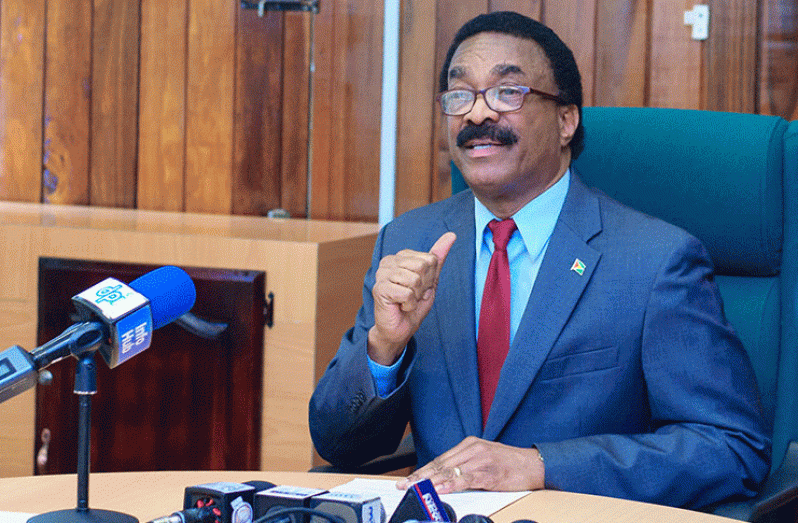– AG says CCJ ruling great victory for Guyana constitutional democracy
Attorney General and Minister of Legal Affairs, Basil Williams said though the Government is now in an interim mode, in accordance with the declarations of the Caribbean Court of Justice (CCJ), it retains its full panoply of legal powers.
In an interview on Saturday, the Attorney General, while reiterating that the President David Granger Administration respects the declarations and orders of the Court, said Government accepts that it is now operating in an interim mode until a President is sworn in following the conduct of elections.
He explained, however, that while the CCJ declared that the Administration is now in an “interim mode,” it did not specify what “an interim government” is. The country’s constitution, he said, does not address the notion of an interim government. In its ruling the CCJ President Adrian Saunders explained that in mandating that the Government remains in office notwithstanding its defeat and the resignation of the President and the Cabinet, Article 106 requires that Cabinet’s tenure in office be on a different footing from that which existed before the No-Confidence Motion. He posited that the Chancellor of the Judiciary, Justice Yonette Cummings-Edwards, in citing Hogg – the Canadian Constitutional expert, was right to note that: “…the government continues in office as an interim government until the next elections ensue and a President is appointed (or reappointed) depending on the results of that elections.”
Justice Saunders told the parties in the matter, “by convention, the government is expected to behave as an interim government and so restrain the exercise of its legal authority.” He added: “It is this interim role that explains the three-month deadline, in the first instance that the Article lays down, in principle, for the holding of the fresh elections.”
Williams said the Administration has now turned to the work of Hogg in keeping with the advice of the judiciary. “On a proper perusal of the book, they say clearly that the Government retains it panoply of powers,” the Attorney General said while underscoring the importance of governing the country. He posited that to strip the Government of its legal powers would be a recipe for anarchy. “In Guyana we have to continue govern, lest we are overrun by narco traffickers, those who are trafficking persons, of course because of the porosity of our borders,” Williams reasoned.
With Guyana preparing for the Fourth Round of Mutual Evaluation by the Financial Action Task Force (FATF) and by extension the Caribbean Financial Action Task Force (CFATF), he said it is imperative to guide the country as it cracks down on money laundering and other serious crimes. “There cannot be a lapse in government when you are threatened with such serious transnational crimes, and of course we have a border controversy,” the Attorney General added while emphasising the importance of being on guard.
As stated by the Constitution, the AG said Government remains in Government until the next election is held. “The Government needs to be there to continue to government, you must have law and order; but of course the Government is primarily there to offer and deliver services to the public as a whole,” Williams further clarified.
The Opposition Leader Bharrat Jagdeo, through his attorneys Senior Counsel Douglas Mendes and Anil Nandlall, had asked the CCJ to order that Cabinet including the President and his Ministers should resigned but such an order was not granted. President of the CCJ, Justice Adrian Saunders, delivering the orders, explained that in mandating that the Government remains in office notwithstanding its defeat and the resignation of the President and the Cabinet, Article 106 requires that Cabinet’s tenure in office be on a different footing from that which existed before the No-Confidence Motion.
Williams said it is clear from the declarations of the Court that the President and Cabinet will continue in Government until a President is sworn in following elections.
He noted too that that the Opposition Leader also asked for coercive orders, instructing the President to name an elections date, but again the Court did not heed to that request. “The court in effect was saying that they couldn’t give a coercive order or give detailed directives to these constitutional actors because the rule is outlined in the Constitution, and our Constitution is the supreme law of the land,” the AG said.
He reminded that Guyana’s Constitution was a result of a referendum in 1980 which gives GECOM the exclusive remit to conduct elections and national registration in the country. “It was a very important decision by the CCJ because it reinforces the doctrine of the separation of powers, that is between the President and Cabinet, the Judiciary and the Legislature, and you know the doctrine is, none should trample on the other, or interfere with the other,” the AG reasoned.
The Court did not set a set a timeline for the appointment of a Chairman of the Guyana Elections Commission (GECOM), but urged the parties to make appointment of GECOM chair a matter of greatest public importance. The Opposition had urged the court to set rigid timelines but this was overturned. The Attorney General said the declarations and orders of the CCJ are a great victory for the country’s constitutional democracy.



.jpg)









